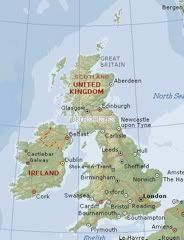Nope, no difference -- still not the same
So I'm doing this multiple-session workshop until June having to do with assessing pupils mathematics levels. I have to film myself giving the assessment to the pupils, suggested so that pupils aren't put off by you furious scribbling, repeated underlining, pounding of fists, and general hair-pulling when they say, "Oh, 2+2=17." With the filming, you can appear natural to them, smiling when they give their crazy answers and you're able to go wail loudly and mournfully at the results in the comfort of your own home.
In our sessions, we watch segments of the other participants' videos. WE DO NOT CRITIQUE. That's left to the workshop leader, not us. Why? We are British and therefore much too polite to do such a thing as criticise others (unless it's our children -- that's just a universal right, no matter the culture). And anyway, we don't know very much either, do we? (Ever humble are the Brits, even when they don't want to be.)
But sometimes in our workshops, we see something a little crazy happening on the videos and I can see the others want to say something. So me, how would I point out that something was executed incorrectly? A matter-of-fact "I think you were supposed to... not... " would do. That would never do here.
Too direct.
Too American.
So you want to be British, huh? This is what you's do. You say -- not to the participant -- but to the workshop leader, "I'm just wondering... should we say it like that?" The questioner knows the answer, but posed in this way, it looks like a query, not a criticism. I have learned that criticism based in a question is just about kosher. "Should she have put those two hideous colours together and called that fashion?" -- that will work.
This is not an exclusively British thing. Some Americans do it. I even do it, in certain contexts, but a lot more since coming here. It's a generally passive-aggressive thing to do, which is why it is thoroughly embraced by the British. Assertiveness is seen as American, and is sneered at, particularly by posh people and many English. (Although I've had many posh people find that 'quaint' little quality of mine 'charming'.) That is one reason why I like working-class people here: direct and no pretensions. Unfortunately, the people in my workshop are not working-class.
But this is not about class distinctions. I'll need another 10 entries to talk about the British and class. That, my friends, is another difference between our cultures, and very weird.




0 Comments:
Post a Comment
<< Home